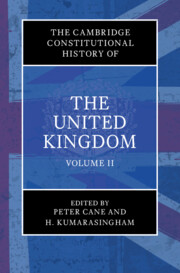Book contents
- The Cambridge Constitutional History of the United Kingdom
- The Cambridge Constitutional History of the United Kingdom
- Copyright page
- Contents
- Contributors
- Editors’ Preface
- 1 The Kingdoms of Anglo-Saxon England (450–1066)
- 2 England after the Conquest
- 3 England in the Thirteenth Century
- 4 England in the Fourteenth Century
- 5 England in the Fifteenth Century
- 6 England in the Sixteenth Century
- 7 The English Constitution in the Seventeenth Century
- 8 A European Perspective
- 9 Wales before Annexation
- 10 The Scottish Constitution before 1707
- 11 The Eighteenth-Century Constitution
- 12 The Constitutional and Parliamentary History of Ireland till the Union
- 13 The United Kingdom in the Nineteenth Century
- 14 The United Kingdom in the Twentieth Century
- 15 The Twenty-First-Century Constitution
- 16 Wales since the Annexation
- 17 Scotland in the Union
- 18 Ireland in the Union
- 19 The Making of Empire
- 20 Constitution and Empire
- Index
12 - The Constitutional and Parliamentary History of Ireland till the Union
Published online by Cambridge University Press: 12 August 2023
- The Cambridge Constitutional History of the United Kingdom
- The Cambridge Constitutional History of the United Kingdom
- Copyright page
- Contents
- Contributors
- Editors’ Preface
- 1 The Kingdoms of Anglo-Saxon England (450–1066)
- 2 England after the Conquest
- 3 England in the Thirteenth Century
- 4 England in the Fourteenth Century
- 5 England in the Fifteenth Century
- 6 England in the Sixteenth Century
- 7 The English Constitution in the Seventeenth Century
- 8 A European Perspective
- 9 Wales before Annexation
- 10 The Scottish Constitution before 1707
- 11 The Eighteenth-Century Constitution
- 12 The Constitutional and Parliamentary History of Ireland till the Union
- 13 The United Kingdom in the Nineteenth Century
- 14 The United Kingdom in the Twentieth Century
- 15 The Twenty-First-Century Constitution
- 16 Wales since the Annexation
- 17 Scotland in the Union
- 18 Ireland in the Union
- 19 The Making of Empire
- 20 Constitution and Empire
- Index
Summary
The continuous history of the Irish parliament runs from 1692 until that institution’s dissolution at midnight on 31 December 1800. Of course, many parliaments had been held in Ireland before the 1690s – the first was held in 1264 at Castledermot in county Kildare – and in subsequent centuries there were many others summoned: to assent to taxation or vote supply for the monarch’s government or their wars, to enact the key statutes of the Protestant Reformation in the 1530s, to transform the Lordship of Ireland (1171) into the Kingdom of Ireland (1541), to confirm the plantations of the early seventeenth century, and to approve various land settlements in the 1660s. Over the years, these parliaments had taken on a recognisably modern appearance. That summoned in 1264 may in fact have been merely a Great Council with little or no representative function, being made up of barons or magnates of the Irish lordship, but in the parliament summoned in 1297 there were two knights elected from each shire and liberty of the ‘Englishry’ (=English colony in Ireland) and they had full power to bind their communities to whatever was enacted in parliament. Irish parliaments met frequently during the fourteenth century, and by the end of that century it is clear that the commons – as those elected to serve were termed – had established a right to be present at any assembly that called itself a parliament.2 However, from the fourteenth to the seventeenth century, Irish parliaments, by now comprising both a House of Commons and a House of Lords, were summoned infrequently, usually for a specific purpose and with lengthy gaps between them. Thus, during the reigns of the Tudor monarchs (116 years) there were just 14 parliaments summoned in Ireland, three of which were of very short duration, and Charles II’s Irish parliament, 1661–66, was the last until 1692.3
Keywords
- Type
- Chapter
- Information
- The Cambridge Constitutional History of the United Kingdom , pp. 288 - 316Publisher: Cambridge University PressPrint publication year: 2023



